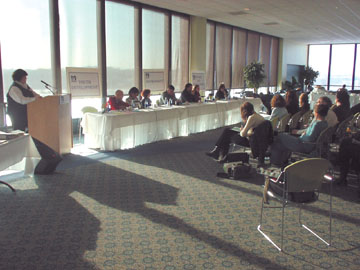UMass Boston students, faculty, and members of the community kicked off a “Raise Your Voice: A Week of Action” campaign February 19 with a meeting to discuss opportunities for community outreach, as well as the difficulties and rewards of involvement. Topics ranged from youth development to environmental concerns to hunger and homelessness. Along with panelists from UMB, Karley Ausiello of the Massachusetts Campus Compact was also in attendance to introduce the mission of the Raise Your Voice Campaign and the projects of the Pew Charitable Trusts, which sponsors the campaign.
After being presented with a Raise Your Voice t-shirt, Chancellor Jo Ann Gora expressed her observations on the dedication to and involvement in the community by today’s youth in spite of their low turnout at the polls, then introduced the panelists.
Joan Arches of CPCS and Human Services and Community Planning spoke of the Community Research Center, which seeks to combine student learning with faculty and professional research to address the needs of the community. The center strives to have a strong impact in the Boston area through sustainable outreach programs. UMass Boston students John Huth, Catherine Moore, and Dan McGuire spoke of how they have gotten involved in youth development and what effect it has had on them.
Huth participates through the Home for Little Wanderers program. There, he is a tutor of research paper writing as part of an overall effort to create a positive transition to college for disadvantaged teens. He expressed his ability to empathize with the students he works with and the improvements he has noticed in his own writing skills as a result of teaching others. He concluded that, “It’s a great experience for them and a great experience for me.” Dan McGuire stressed how much need there still is for community involvement.
UMB professor Rob Beattie introduced the environmental studies program at UMass Boston. One aspect of this program is to explore environmental influences on learning. “Getting yourself out in the community as a researcher can build connections that you never knew existed before,” said Beattie. Student Leah Ross elaborated by outlining the research she is performing through a National Science Foundation grant. Her project involves testing the surface soil of tot lots, which are playgrounds for children aged 3-5, for contamination by heavy metals such as lead and arsenic. This research created an opportunity to work with the Food Bank testing organic food lots. According to Ross, she has gained invaluable experience in research, gathering data, and using equipment, while positively influencing the Boston community.
Speaking on homelessness and hunger were Linda Dumas and Margaret McAllister from the College of Nursing. Their presentation proceeded without the benefit of student representatives, since the students were covering a nursing shortage at the Pine Street Inn. Dumas described how nursing students work in clinics at the Barbara McGinnis house and the Long Island shelter in addition to the Pine Street Inn. She also illuminated some the obstacles to being effective in the community, such as the lengthy process of gaining trust and the difficulty of creating sustainable programs, a sentiment echoed by all the panelists. In addition to pointing out how pervasive the problem of homelessness is, McAllister illustrated the benefits of the College of Nursing projects. The involvement of nursing students at clinics prepares them to respond effectively to the particular needs of the homeless, mentally ill, and substance abusers while encouraging cultural sensitivity and providing much-needed medical care to an underserved population.
Following the discussion, Joyce Morgan, director of Student Life and co-chair of the Campus Community Team, opened up a question-and-answer period.
The focus turned to methods of improving and expanding the existing programs. Creating more interdisciplinary features was seen as a very important goal, as was gathering feedback about the programs and ensuring academic integrity. All of these points led back to the potential for the Community Research Center to become a hub for the many forms of outreach. Beattie looked to the center as a central location for obtaining grants and funding since “working in the community is very resource intensive.”
Jain Ruvidich Higgins encouraged anyone interested in getting involved in the community to go to the Community Research Center, saying there are dozens of opportunities available, and even more potential for involvement.
Jean Arches concluded “We have the potential to have so much more of an impact if we coordinate what we’re doing.”





















































